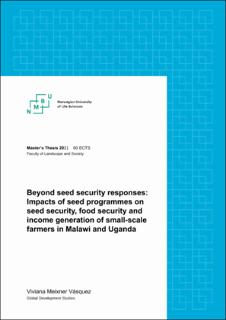| dc.description.abstract | Seeds are essential inputs for small-scale farmers' agricultural activities, but farmers' seed access is limited in developing countries. The theory of change proposes that through seeds, farmers could improve productivity and hence become food secure and earn sustainable income. Consequently, non-governmental organizations (NGOs) provide quality seeds to farmers through different seed security responses (SSRs). However, it remains understudied how through accessing seeds via SSRs in the humanitarian action and long-term development interventions, farmers could improve their living conditions in the long-term. Here, two case studies of SSRs implemented by two selected NGOs are analysed through the lens of the seed and food security frameworks, one in the context of humanitarian action in Uganda and the other in long-term development interventions in Malawi. The analysis is based on qualitative information from 45 semi-structured online interviews, 20 structured interviews, 2 focus group discussions and 10 key informant online interviews. The sample of interview participants included local farmers, SSR staff from the selected NGOs, seed traders and key informants who have worked and researched on seed security responses in African countries. The results of the study indicate that the NGO working within humanitarian action mainly provides certified improved seeds while the NGO working in long-term development provides local seeds. Irrespective of chosen seed type, farmers' long-term food security remains a challenge in both case studies and a decent and sustainable income has not been achieved. The data shows that seeds contribute to increased productivity, particularly local seeds, but other barriers such as land size, market constraints and limited access to other agricultural inputs prevent farmers from becoming self-sufficient. To achieve self-sufficiency, more local adaptation of the SSRs and inclusion of other agrarian change measures are suggested. | en_US |

